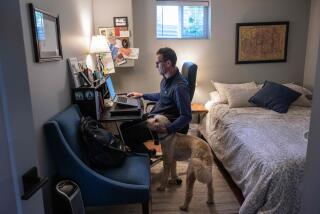Pathfinders : Career Counselors Help Job-Seekers Determine What Kind of Work Best Suits Them
- Share via
It’s one thing to turn a dream job from a dream into a reality. But what if you don’t even know what your dream job is?
Or what if the job that seemed like a dream a few years ago doesn’t seem like such a great fit anymore? If either of these describe your situation, you may be in the market for a career counselor.
There are as many reasons to use a counselor as there are counselors available. A career counselor can be a facilitator, a sounding board or a mirror, said Cindy Chernow, director of alumni career services at UCLA and regional chairwoman of the Southern California Assn. for Counseling and Development, a chapter of the California Career Development Assn. Not only can they help you see yourself better, they can also show how you appear to others.
“They can be a real reality check,” she said.
Services can range from helping create a resume, to critiquing practice interview sessions. Some counselors focus on helping you find out what you want to do with your career based on your skills, interests, values and personality. Others hone in on how to find the job once you’ve found a focus.
Whatever you want the focus to be, you and the counselor should be clear what it is in the beginning. And it’s important to remember what not to expect from a career counselor.
Career counselors are not there to find you a job, said Rachelle Cohn, part-time director of career counseling at Pierce College in Woodland Hills. “A lot of people have the expectation that we will do the work for you,” she said.
Counselors are often mistaken for employment services, most of which charge a fee for finding you a job, or head hunters, who are paid by organizations to recruit employees.
But counselors act more as guides who help open doors, Cohn said. They are there to help you get the skills you need to find the job yourself.
How do you find the right counselor for you? Most people would not entrust their money to a financial planner without a little research. The same should be true for something as important as choosing a “personal trainer” for finding that dream job. Here, then, are some guidelines for choosing a career counselor.
The first step is to interview the person on the phone to make sure you have similar expectations of what a career counselor can and can’t provide, Chernow said. Most career counselors will spend some time on the phone to make sure there’s a match.
Tell the counselor briefly what your situation is and ask what you could expect from counseling. Find out about the counselor’s technique--do they use interviews and tests, do they give you homework--and how many sessions the process usually takes. It’s helpful to find out if the counselor has worked with other clients in positions similar to yours.
Some counselors are more in tune with the job market than others, said Patricia Schwadron, a labor market researcher who works with career counselor Susan Miller in Los Angeles. Schwadron, for example, constantly talks to local professional organizations, as well as people in the field to find out where the jobs are. Other counselors are more focused on helping people through the self-assessment process to figure out what that dream job is, Schwadron said.
Find out if the counselor is certified by the National Board for Certified Counselors. Certified counselors have graduate degrees in counseling or related professional fields. They have completed supervised counseling experience, had a minimum of three years of full-time career development work experience, and have completed a certification exam. They also adhere to a code of ethics that discourages such things as grandiose promises, exorbitant fees and breaches of confidentiality.
In addition, you can check whether a counselor is licensed in California. Licensing requires completing a master’s degree in counseling as well as two licensing exams. It is a separate process from national certification. The California Career Development Assn. has a registry listing licensed counselors and their specialties. Although anyone can belong to the association, only those who have been licensed can be listed in the registry.
Word-of-mouth, local colleges and community organizations such as Women at Work in Pasadena or Jewish Vocational Services in Los Angeles, can be good referral sources for career counselors as well.
Most important, make sure the counselor has had some level of “real-world work experience,” Chernow said. Those are the ones who are most likely to have the most realistic insights into the way the job market currently works.
Once you’ve begun working with a counselor, do periodic checkups to make sure you’re on track. Ask yourself if you feel like you’re making progress, Chernow said.
Most career counselors meet with clients for five or six one-hour sessions and charge between $65 and $75 an hour. However, those who specialize in certain fields, such as the entertainment industry, or in helping certain groups of people, charge up to about $100 an hour, Chernow said.
A good career counselor will show you how to tap the hidden job market through networking, Chernow said.
“A lot of jobs are not even created until you start talking to people,” Chernow said. Career counselors help you know where to start looking, but they don’t guarantee you a job.
One thing most career counselors agree they will do is open their clients’ eyes to new possibilities. The role of a career counselor is to help people inform themselves about the many possibilities that exist, possibilities they may never have considered before.
“There are 22,000-plus listed occupations,” Chernow said. “And the average person typically knows of about 1,000 of those.”


